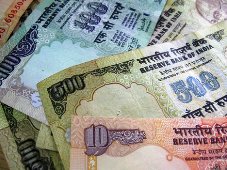 | « Back to article | Print this article |
 The Reserve Bank of India said on Monday the timing of its recent monetary tightening was right and inflation would ease in coming months, subject to normal monsoon and stable world oil prices.
The Reserve Bank of India said on Monday the timing of its recent monetary tightening was right and inflation would ease in coming months, subject to normal monsoon and stable world oil prices.
The wholesale price index-based inflation, which neared double-digit level in February, has probably peaked and was likely to decline as the country expected a good winter crop and drop in oil prices, RBI Deputy Governor K C Chakrabarty told reporters on the sidelines of a function in Bangalore on Monday.
"Oil prices and coming monsoon will determine the two-way movement of inflation rate," he said, adding that the inflation rate has probably peaked and might decline in the coming months.
With hopes of favourable developments on oil prices and winter crop, inflation was expected to ease.
"If they are reasonably placed, inflation rate should come down," he said.
Asked if it was late in raising policy rates, he said "RBI is right on the curve."
The apex bank had on Friday raised its key short-term borrowing and lending rates by 25 basis points to 3.5 per cent and 5 per cent respectively to tame inflation, which rose to 9.89 per cent in February from 8.56 per cent in January.
The RBI had projected inflation to be 8.5 per cent by this fiscal-end. "With rising demand side pressures, there is risk that WPI inflation may cross double digits in March 2010," the Reserve Bank had said while announcing the monetary measures.
Asked whether RBI will raise its projections for inflation, he said this fiscal is about to end and target for inflation will be pegged for next fiscal at the April 20 policy.
To a query whether there is an asset bubble in the economy, Chakrabarty evaded a direct reply, saying,"bubbles are always there in an economy. Whether that bubble will burst or not we do not know."
In its statement, while upping the repo and reverse repo rates, the RBI had also talked about rising oil prices and spread of inflation from food items to non-food products. ". . .the rate of increase in the prices of non-food manufactured goods has accelerated quite sharply.
Furthermore, increasing capacity utilisation and rising commodity and energy prices are exerting pressure on overall inflation. Taken together, these factors heighten the risks of supply- side pressures translating into a generalised inflationary process," the RBI had said.